The best AI tools for marketing such as Jasper AI, Manychat and the likes have impacted marketing in various ways.
Some of the biggest brands like Google, IBM, and Airbnb are using AI marketing tools to gain a competitive edge.
Table of Contents
What are the best AI tools for marketing?
AI marketing technologies improves a number of marketing strategy factors.
These solutions optimize campaigns, customize content, and enhance overall marketing success through machine learning, data analysis, and automation.
Various AI marketing tools you can adopt includes:
Jasper AI
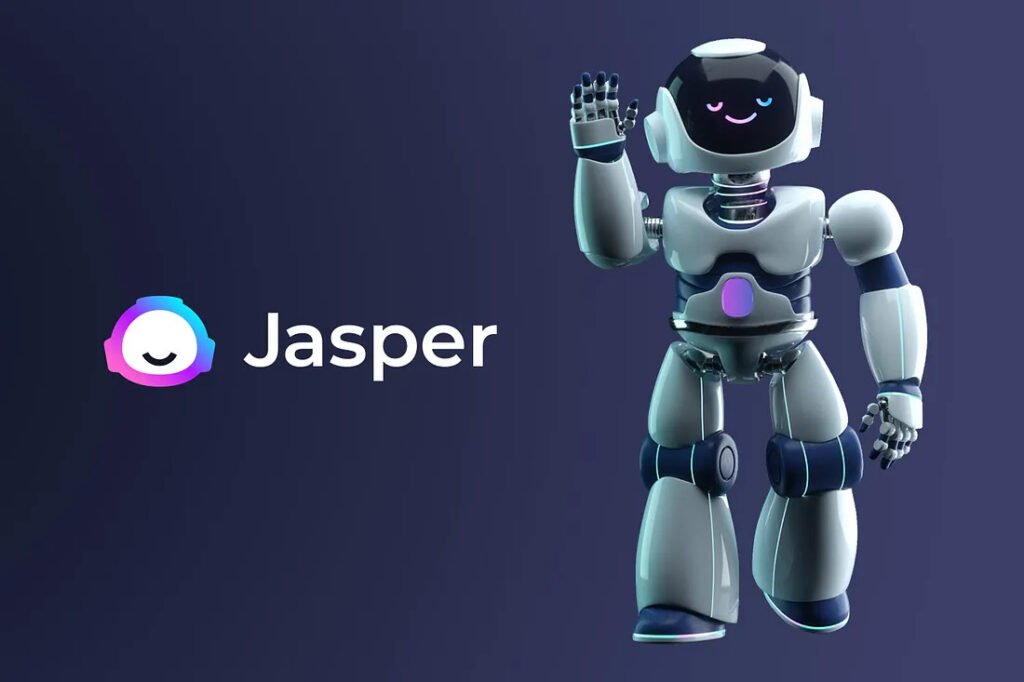
Jasper is one for the best AI tools for marketing when it comes to content creation. With this tool, you can effectively optimize all aspects of your content marketing campaigns.
Using content templates reduces the amount of time you spend on first drafts by an astounding 80%, and it goes even further by creating visual material to go along with your pieces.
As a simple digital marketing tool, Jasper boosts your search engine rankings through the optimization of your blog content marketing strategy, landing pages, email marketing campaigns, and social media posts.
Features of Jasper AI:
- AI writing templates: Jasper has a library of more than 50 templates that can produce initial drafts for a variety of content types, such as blog posts with SEO optimized text, Amazon product descriptions, Facebook Ad headlines, succinct social media postings, and more.
- Art Creation: It produces professional-quality illustrations and photos for blog entries, landing web pages, and ads with ease.
All you have to do is describe the desired image and Jasper’s AI will create it for you.
- Brand Voice: Jasper uses machine learning to identify your brand voice so that all of your marketing collateral is consistent.
With the help of your product catalog, style guide, and company history, you can train Jasper to work in unison with your brand.
Pros and Cons of Jasper AI:
Pros:
- Jasper’s Content Is Considerably Accurate
- Jasper goes beyond text and can generate visual art to accompany your posts, enhancing the visual appeal of your marketing materials
- Jasper can be applied across various marketing channels, including social media posts, landing pages, email marketing campaigns, and blog content marketing, contributing to a comprehensive marketing strategy.
- The time-saving features of Jasper, along with its potential to streamline workflows, could lead to cost savings for businesses in terms of labor and resources.
Cons:
- High pricing. Several reviewers have mentioned that they found the pricing of the product to be on the higher side
- Jasper needs you to write detailed prompts. If you are going to give a generic prompt, the output you get will also be short.
Use Case of Jasper AI:
- Blog writing:
- Write, edit, and format your content all within the easy-to-use document editor.
- Analyze and optimize your content against SERP competitors using the SurferSEO add-on.
- Content Strategy:
- Quickly repurpose content into other formats for wider content distribution.
- Create content assets for full, cross-functional marketing campaigns.
Manychat
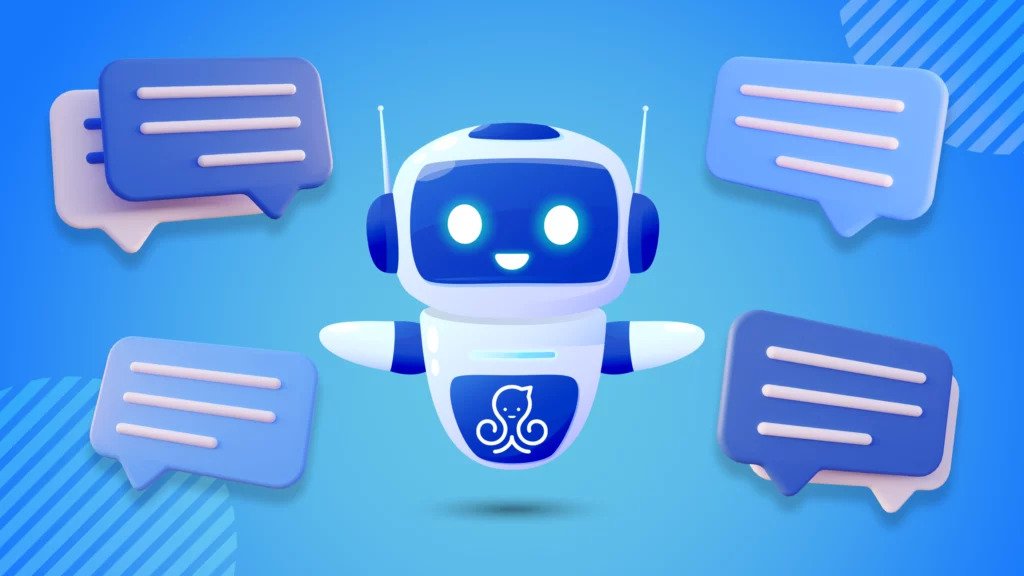
Among the best AI tools for marketing is Manychat. This AI marketing tools assists you in creating emails and blog posts, but this AI tool which is ranked among Best AI tools for marketing can engage in conversational marketing with your target audience.
With the use of natural language processing, Manychat offers an engaging consumer experience by replying to messages sent via WhatsApp, Facebook Messenger, Instagram Direct Messages, and SMS text messaging.
Features of Manychat:
- Friendly user interface: ManyChat gets great reviews for its user-friendly dashboard and simple design, which are two of its most notable features:
- Clear and self-explanatory, the interface has large buttons for easy configuration activities.
- The icon-heavy design of ManyChat adds to its appealing style, and it does a great job of explaining functionality to users as they move across the platform.
- Multi-Channel support: ManyChat is now supported by additional messaging platforms, offering a more complete multichannel approach, even though it first gained popularity on Facebook Messenger.
- Analytics and Reporting: With the analytics and reporting tools offered by ManyChat, users are able to track the effectiveness of their campaigns and chatbots.
Pros and Cons of ManyChat:
Pros:
- Low Cost: Up to 500 users can use ManyChat’s free plan, while their Pro plan costs just $15 a month as of the time this article was written. They provide an Enterprise solution as well.
- Multi-Channel support: Manychat integrates with Facebook, Instagram, WhatsApp, SMS, Telegram, Websites.
Cons:
- Dependency on Internet connectivity: ManyChat is a cloud-based platform, hence it depends on internet access to function.
Individuals residing in areas with erratic or unstable internet connectivity may face challenges in maintaining regular platform utilization.
- Limited Customization for Advanced Users: Expert users might discover that ManyChat is less flexible and customizable than more sophisticated bot-building platforms that support large amounts of coding.
Use Case of ManyChat:
- Keeping track of events for your analytics: Despite ManyChat’s somewhat simplistic analytics, it nonetheless provides you with a wealth of information about what users are up to on your website.
- Lead generation: Companies may create chatbots with ManyChat that interact with users and gather data for sales development.
Omnisend
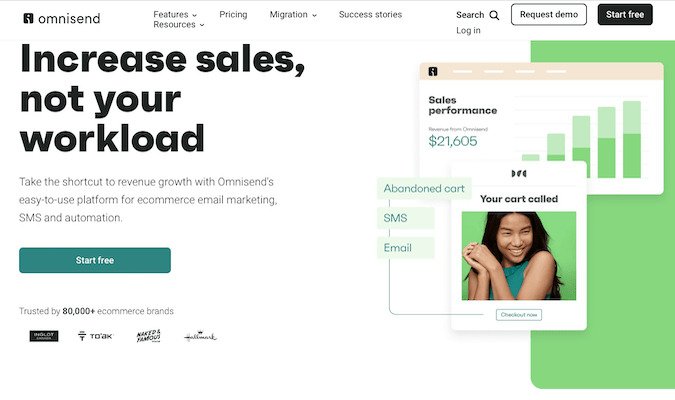
Omnisend is recognized as one of the best AI tools for marketing, it provides an extensive feature set designed to improve e-commerce marketing automation.
Omnisend optimizes user engagement by utilizing artificial intelligence to provide customized and targeted campaigns.
Features of Omnisend:
- Personalization: Omnisend’s influence is in its ability to personalize. Conversion rates are raised by the AI algorithms’ analysis of consumer data to provide offers, product recommendations, and personalized content.
- Analytics and Reporting: With the use of the platform’s AI-powered analytics and reporting features, marketers can monitor the effectiveness of their campaigns.
The knowledge acquired can be put to use to improve tactics and future marketing initiatives.
- Segmentation and targeting: Omnisend uses AI-driven segmentation to assist marketers in grouping their target audience according to a variety of attributes.
This makes it possible to create highly targeted advertising campaigns for various demographics.
Pros and Cons of Omnisend:
Pros:
- Automation Efficiency: By automating tedious operations, AI-driven automation workflows free up time and resources so marketers can concentrate on strategy and creativity.
- Cross-Channel integration: Its ability to seamlessly integrate various communication channels ensures a consistent marketing strategy, improving overall customer experience.
Cons:
- Pricing Structure: The price structure of Omnisend could seem a bit high to certain consumers, particularly for companies with tight budgets.
- Learning Curve: Although the UI is easy to use, users who are unfamiliar with marketing automation platforms, especially those with complex requirements, may need to go through a learning curve.
Use Case Omnisend:
- Dynamic Content and A/B Testing: The organization or person may produce dynamic content for emails with Omnisend, enabling real-time updates on product availability and pricing. AI analyzes the results of A/B testing to determine which subject lines, images, and calls-to-action work best and helps to improve campaigns in the future.
- Personalized Product Recommendations: Using an analysis of each customer’s past purchases and browsing activity, Omnisend’s AI algorithms provide customized product recommendations. This guarantees that every client gets recommendations that are specific to their interests.
Optimizely
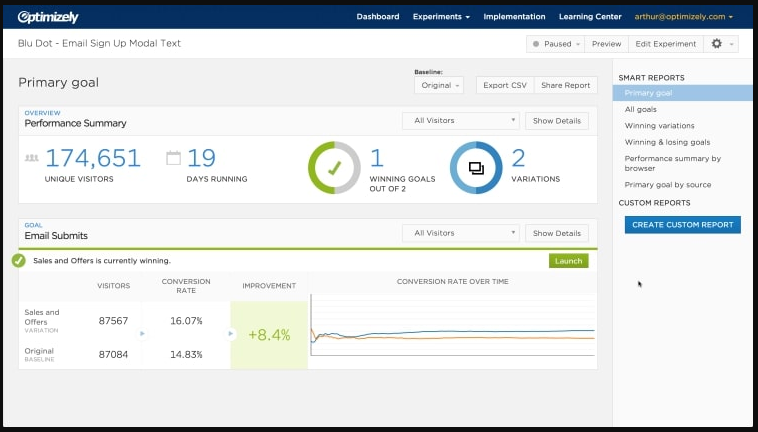
Businesses are looking for technologies that help improve user experiences and boost their online presence in the constantly changing field of digital marketing.
One such well-known option is Optimizely, which is regarded as one of the best AI marketing tools. Well-known for its adaptability.
Optimizely is the best AI tools for marketing. It gives marketers access to a range of tools for improving user experiences on websites and mobile apps.
Features of Optimizely:
- Analytics and Insights: The platform provides robust analytics and insights powered by AI. Marketers can gain valuable data-driven insights into user behavior, allowing for informed decision-making and strategy refinement.
- Experimentation and A/B Testing: Marketers can easily run experiments and A/B tests using Optimizely. This feature makes it possible to compare different versions in order to identify the most successful engagement and conversion tactics.
- Multi-Channel Optimization: Understanding the value of a unified marketing strategy, Optimizely makes multi-channel optimization easier. Marketers may ensure messaging consistency by extending their tests and optimizations across several platforms.
Pros:
- Ease of Use: Optimizely is well-known for having an intuitive user interface that makes it suitable for both marketing experts and non-techies.
- Scalability: The platform can be expanded to meet the requirements of companies of any size. Regardless of the size of your business, Optimizely may change to meet current requirements for marketing.
- AI-Powered Suggested Readings: By utilizing AI, Optimizely helps marketers remain ahead of the game in the evolving digital marketplace by offering insightful recommendations for enhancements.
Cons:
- Pricing: Although Optimizely offers significant value, some firms might find its cost to be a bit high, especially for smaller budgets.
- Learning Curve for Advanced Features: Even if the most complex functions are easily understood, it might take some practice and patience to become proficient with them.
Use Case of Optimizely:
An effective application for Optimizely is within the context of an online store. Using A/B testing and personalization tools, marketers may test out various call-to-action buttons, product placements, and content that is customized for certain categories of users.
Marketers can continuously improve conversion rates and the whole shopping experience by utilizing Optimizely’s AI-driven analytics to inform their strategy.
Intercom
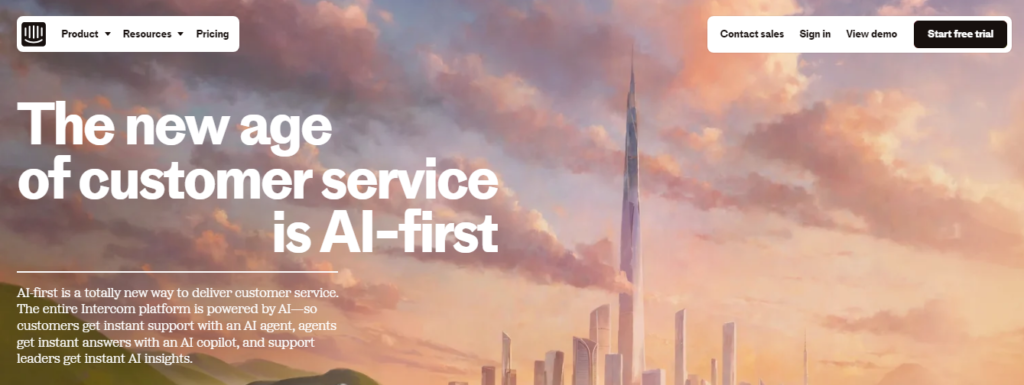
Intercom is a powerful customer messaging platform that has made an impact, hence why it’s considered to be among the best AI tools for marketing.
Known for its innovative approach to customer service, Intercom smoothly incorporates AI to improve user engagement and optimize marketing initiatives.
Features of Intercom:
Real-time messaging: Businesses can interact with consumers and website visitors in real-time through the use of intercom, which promotes quick and personalized communications.
AI-powered chatbots: By utilizing AI, Intercom’s chatbots can automatically respond to standard inquiries and assist customers on their path through the company.
In-App messaging: Intercom enables marketers to engage with users directly within the application, providing timely updates and information.
Data analytics and reporting: Intercom provides reliable analytics solutions which gives companies the ability to assess the success of their message tactics and offer recommendations for ongoing development.
Pros and Cons of Intercom:
Pros:
- Personalization: Businesses may improve user experience and increase brand loyalty by personalizing customer interactions with Intercom’s AI capabilities.
- Automation: By reducing manual duties, the platform’s automation features enable marketing teams to concentrate on key projects while maintaining timely and pertinent messages.
- Multichannel integration: Intercom offers a single platform for client interaction by integrating with email, in-app messaging, social media, and other communication channels with ease.
Cons:
- Pricing Complexity: Intercom’s pricing structure may seem complicated to certain users, and when more features and users are added, the costs may go up.
- Learning Curve: Although the platform is easy to use, it could take some time and training to become fully proficient with all of its capabilities.
Use Case of Intercom:
As a customer messaging platform, Intercom finds an excellent place in the world of AI-driven marketing.
Imagine an e-commerce company using Intercom to interact with website visitors. The chatbots that are driven by AI recognize the interests of users and offer relevant product recommendations.
Targeted promotions are ensured by automated follow-up communications and consumer categorization. The end product is an audience-resonant marketing plan that is more effective and individualized.
FAQs: Best AI tools for marketing
Are AI tools for marketing suitable for small businesses?
A lot of AI technologies are available for small enterprises, offering affordable solutions for activities like email marketing and social media management.
How can AI tools improve marketing tactics?
AI tools examine large amounts of data, providing insights for tailored advertising, task automation, and content optimization for increased interaction.
Can AI technologies in marketing take the place of human creativity?
AI does not replace human ingenuity. Although it manages automation and data analysis, strategy, storytelling, and creativity still require human input.
What is the cost range for AI marketing tools?
The cost varies depending on the features, scalability, and complexity of the tool.
Some tools offer subscription plans, while others may have pricing based on usage or the size of the business.
Which industries can benefit the most from AI marketing tools?
AI marketing tools can benefit a wide range of industries, including e-commerce, retail, finance, healthcare, and B2B services.
Any business that relies on marketing to reach and engage customers can leverage AI tools for better results.
